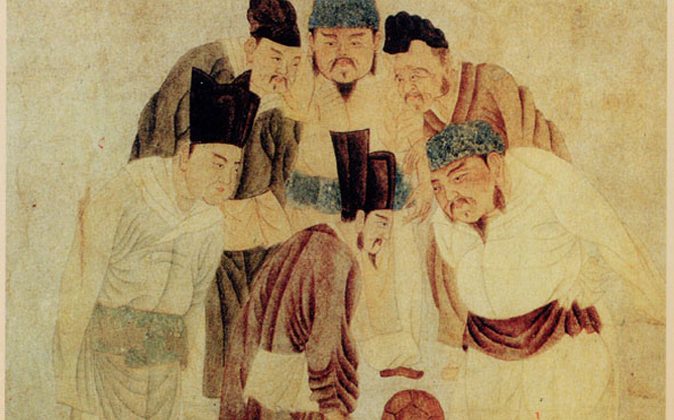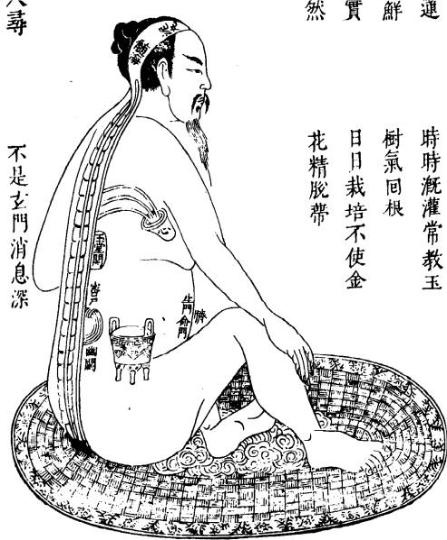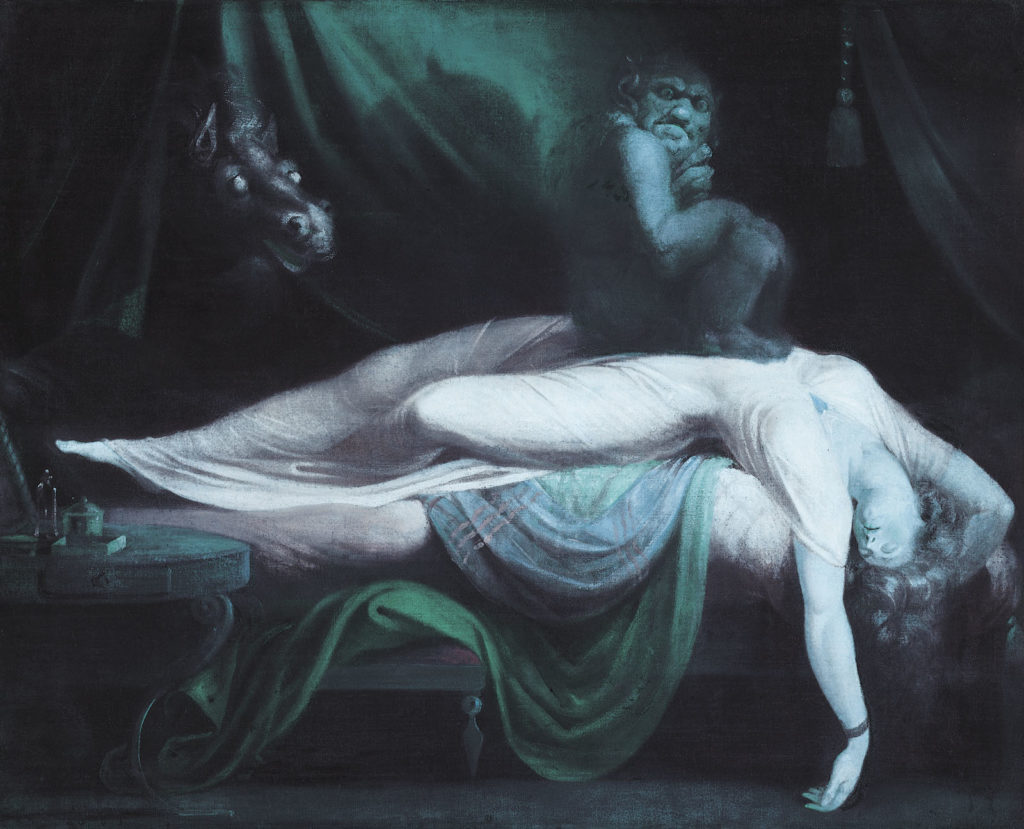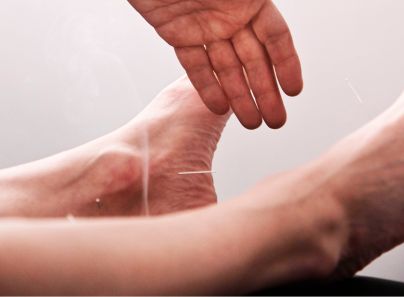
The Ghost Points: Ancient Acupuncture Treatment for Obsession, Addiction & Destructive Behavior.
An acupuncture protocol that captures the imagination of many acupuncturists are the “Ghost Points,” made famous by the great Tang Dynasty era doctor Sun Si Miao (581-682 CE).
Miao worked as a traveling doctor for many years during a very exciting time in Chinese history: when the north and south of China were united. He spent many years traveling the vast country, treating patients and gathering wisdom from the many doctors, shamans and healers he’d meet along the way.
One piece of wisdom he gathered was the “Ghost Point” protocols, traditionally used for demonic “ghost” possession. The time period Chinese medicine was developing (the Classical Era) was highly superstitious. Disease was thought to be caused by climatic factors, agents (virus, bacteria, fungus: called forms of “Wind”), lifestyle, emotional excess and entities (including parasites, ghosts, demons, worms etc).
Modernly, in our anti-superstitious Western culture, the “Ghost Points” are used for various mental illness states, as well as addiction and fixation. It’s still debated as to whether “demons,” “ghosts,” “entities” and various forms of parasites and worms exist. However it is more widely believed in Chinese medical circles that mental illness is caused by “phlegmatic” states (dysfunction of body fluids and blood: physiology) instead of entities.
There are four sets of “Ghost” treatments (mostly comprised of three or four acupuncture points each) representing (and treating) progressive stages of “possession” (or mental illness in modern language). They begin by treating relatively mild symptoms and progress into more severe situations.
Last week I used the “third stage” of the “Ghost Points” for a patient whose body strongly requested this level of intervention. The “Ghost Points” are not often used in my clinical practice, as they can be very strong. However, a patient suffering from a very “sticky” romantic obsession indicated that the “third stage” of the “Ghost Points” was right for him based on his physical symptoms, but also his demeanor.
I’d been working with this patient for some time. He’d been having a very difficult transition period out of a relationship that continued to “haunt” him. He said the relationship with the woman he’d been with felt like it “changed” him, causing him to behave in ways that were foreign to him. He said he observed himself acting more like his former girlfriend than himself. Even his friends and family had commented on the change in his demeanor and behavior.
According to Classical Chinese medical literature, when a person undergoes a change in their personality or demeanor where they begin acting like someone other than themselves, especially if the change involves depression or obsession, it can be due to “possession by an entity.” In more modern language, we could say this man became obsessed by the woman he was dating, possibly due to a form of trauma or abuse sustained either within the relationship or earlier in his life. In either case, some force overwhelmed his mind and willpower, causing him to become unable to stop obsessing over his past partner. The obsession began to influence his behavior and change his personality, making him feel “crazy” and “imprisoned.” He’d come to me hoping I could help stabilize his mind so he could move on with his life and “return” to himself.
Physically, in addition to his mental symptoms, the patient came to me complaining of intermittent, recurrent jaw pain that would travel up into his ear and down into his throat. He had a history of sinus issues that would usually occur when he was depleted, often after a “wild” weekend or night, which he’d begun engaging in more frequently with his ex-girlfriend and after they’d split. The patient also had a recurrent “wart-like” growth on his chin that would change size, he’d say, usually relating to his level of obsessiveness. The growth appeared during his last relationship and remained in various size since.
What struck me first about the patient’s current situation was that the pain in his jaw was located at the site of a “Ghost Point”: ST-6 “Ghost Bed” at the center of the jaw. The wart-like swelling was located at the “Ghost Point” CV-24 “Ghost Market.” at the center of the chin. These two points are amongst the acupuncture points contained in the “third” of the Ghost Point formulas. The third point is PC-8 at the center of the palm. The “Ghost Point” name of PC-8 is “Ghost Cave,” but it’s the regular name of PC-8 that tied everything together: “Lao Gong,” translated as “the palace of toil.” The meaning of “Lao Gong” refers to a situation or fixation that a person is stubbornly trying to make work in their lives, even though it is causing them distress, suffering and maybe even making them sick. PC-8 treats wasting, usually from all-consuming desires and passions that are eating away at a person’s essence. PC-8 represents a person who is sacrificing their health and sanity to hold onto something. They are usually, in a way, going against their nature, behaving in ways that deplete their energy rather than nourish them.
The imagery of these three “Ghost Points” based on their names described my patient’s experience as he’d been telling it to me. “Ghost Bed” gives the image of a person who is so intimate with an “entity” that they seem to sleep with it, maybe dreaming about it or actually seek out sex with such types of people. This point makes reference to a romantic or sexual obsession. Obsessions that don’t even cease when the person sleeps.
“Ghost Market” gives the image of the person as a feeding ground for the entity. They allow that which they are attached to (or that which is attached to them) to draw energy from them. Either they begin giving their time, energy or resources (money etc) to the person they are attached to. Or they just devote their lives and mental resources to this obsession. “Ghost Cave” brought to mind the image of the Liao points, which are the names for boney areas of the body where pathogens (or repressions) go to hide, linger and slowly consume the body. But “Ghost Cave” also brought to mind the isolation tendency for a “possessed (obsessed?) person.” They tend to retreat from their normal lives so they can live with their obsession, often preferring the obsession to actual reality. The “Ghost Cave” also refers to secretive behavior that is often a manifestation of a possessed or addicted person. The addiction becomes more hidden, which causes the person to retreat further and further from their normal lives, and maybe even from themselves.
Further significance came from the normal physiological function of the point CV-24 which is located on the Conception Vessel, which is called the “Sea of Yin,” or the “Sea of Bonding.” The philosophy of “Yin” is the ability to feel contained and content in life. It is a necessary component in bonding with another person, but more importantly it is a measure of how contained and content we can be within relationship with ourselves. It is a measure of how at peace we are with ourselves, and in our lives. Lack of Yin will manifest in agitation, insomnia and inability to be alone with oneself.
The patient told me he’d always suffered somewhat from “co-dependency,” yet he was doing quite well being alone before he’d met his ex-girlfriend. But since the relationship he’d found himself very deep in co-dependency. It was very uncomfortable for him to be by himself. This was one reason, he thought that led to his “wild behavior”: so he’d feel less alone. In a way, he was always trying to recreate the intensity of the connection he’d felt with his ex-girlfriend by simulating the relationship with others, often through reckless behavior that had a depleting effect on his body.
The point ST-6, being a point on the Stomach channel, philosophically relates to desire: to the “full Fire” or lust for life. Due to its location on the jaw, ST-6 also relates to stubbornness: a person who tightens their jaw with tenacity for that which they desire, even if it hurts or harms themselves, or others.
The acupuncture treatment was performed like a meditation, which they usually are, but in this case more focused. I needled the acupuncture points and asked the patient to “watch” the images that came into his mind during the treatment. Afterwards, we discussed them. And worked to let them go.
We repeated the treatment three times. After a short break in treatments, the patient returned seeming a different person. This had happened a few times in the past when I’d used “Ghost Point” treatments with patients: they’d often return seeming (and feeling) strikingly different.
I recall years ago seeing a woman who wanted to commit suicide. She was unkempt, very depressed and seemed distracted to the point where she could hardly focus. After just one “Ghost” Treatment (the first level), she returned a fully engaged, functional, animated (and dressed up) lady. She said she finally felt “alive” again after many years feeling almost dead. I hadn’t thought about that acupuncture session for a long time, until I saw a similar dramatic change occur with my current patient.
He returned to my office with a lot of energy, but calm with a good focused sparkle in his eyes. He told me he spent the weekend wanting to be by himself. He realize he’d not been able to “feel” his own “energy” for a long time. He’d been so focused on others. He finally felt happy to be with himself, with his “spirit” as I suggested to him. He’d also decided to let some things (and people) go in his life, and decided on a new path of study which he’d wanted to explore years ago before he became distracted.
He still would periodically obsess about his ex-girlfriend, yet it started to seem less “sticky.” He was better able to focus on himself and take steps to move forward in his life on a new path. He also seemed happier and more hopeful.














No Comments